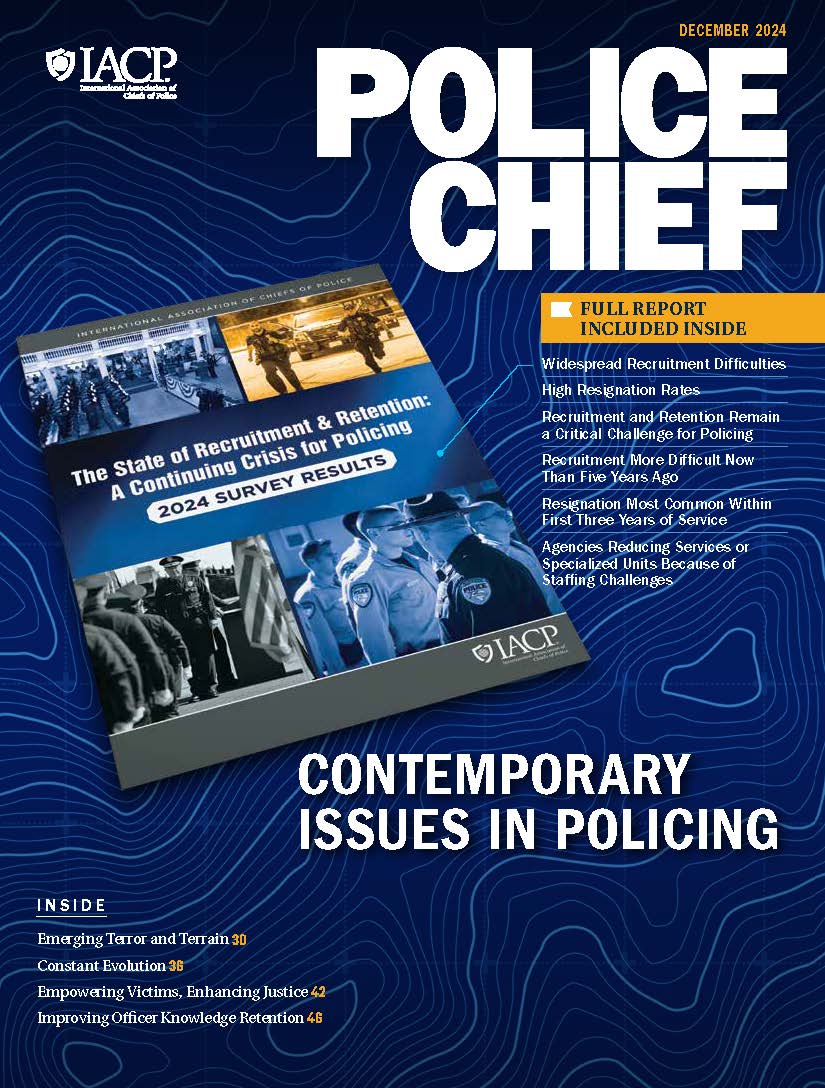| IACP Working for You |
|---|
|
In the mission to support the law enforcement leaders of today and develop the leaders of tomorrow, the IACP is constantly involved in advocacy, programs, research, and initiatives related to cutting-edge issues. This column keeps you up to date on IACP’s work to support our members and the field of law enforcement.
Best Practices Briefs: Issues in Protecting Civil Rights The IACP, in collaboration with the Department of Justice (DOJ), has released its new best practices resource briefs, collectively titled “Issues in Protecting Civil Rights.” Created in response to the increasing need for police executives to be involved in the prevention of unconstitutional police practices, the series of briefs focuses on general use of force, electronic control weapons, and use-of-force investigation policies, as well as the civilian complaint process and employee early intervention programs. Meant as a reference for police chiefs to use in overseeing and making changes to their operations, the briefs break down policies and dictate considerations to be taken into account when an officer is trying to decide if force is necessary in a given situation, including awareness of the surrounding area and the actions of the subject. These briefs are currently available to IACP members. Visit www.theiacp.org/protectandservefield to learn more or access the briefs.
Agency Self-Assessment Tool for Youth Focused Policing (YFP) Law enforcement officers frequently make decisions that affect youth, some who have become victims in their homes, schools, or on the Internet and have had to cope with violence, drugs, mental or emotional disorders, and other abusive situations on a daily basis. Interactions between officers and youth, whether they are victims, suspects, or witnesses, can have lasting effects on the youth and the community, as well as on public safety overall. Providing officers with the tools necessary to make thoughtful and evidence-based decisions in these situations is a need that often goes unfulfilled. In response to this lack of resources, the IACP has developed a Youth Focused Policing (YFP) self-assessment tool to help police work with youth to reduce crime, delinquency, victimization, long-term health and criminal justice costs, and involvement in the juvenile and criminal justice systems. An element of the IACP’s Improving Law Enforcement Responses to Youth Training and Technical Assistance Program, this self-assessment tool seeks to assist law enforcement agencies in assessing their policies and practices in prevention and response strategies to reduce juvenile offending, reoffending, and victimization. To access the assessment, visit www.theiacp.org/youthfocusedpolicingassessment.
#WhyIWearTheBadge Campaign #WhyIWearTheBadge is an IACP campaign to highlight the diversity and commitment of law enforcement professionals. The badge is a symbol of courage, strength, and integrity—and with the display of the badge comes great responsibility. So why do thousands of men and women wear the badge each day? IACP encourages officers from around the world to share their photos, videos, and other testimonials on social media to explain #WhyIWearTheBadge. This campaign will launch during Police Week, May 10–16, 2015. ♦ For more information visit www.theiacp.org/WhyIWearTheBadge. |


